Mastering Restaurant Sanitizing: Best Practices for Kitchens and Dining Areas
Master restaurant sanitizing with clear steps for kitchens and dining areas. Learn methods, checklists, and procedures to keep your team safe and...
Leftovers are highly perishable foods that require proper handling and strict monitoring to prevent foodborne illness.
Foods have a definite amount of time in which they will remain safe for consumption and acceptable in terms of quality. The rate at which food will last depends on its nature and storage condition.
Even with the best storage conditions and preservation methods, food products will eventually spoil. Especially for foods such as leftovers, the risk of earlier spoilage is very likely to occur. Food handlers must know how long are leftovers good for to maximize the use of food ingredients.
Proper storage is one of the main principles of food safety. Storage conditions can affect the rate at which foods spoil. Under low-temperature ranges, foods can remain safe for a longer period of time. This storage condition is essential for preventing the growth of harmful bacteria on perishable foods, such as leftovers.
In this blog post, we'll answer the question: how long are leftovers good for? And in case you want a cheat sheet, download our free food leftovers chart:
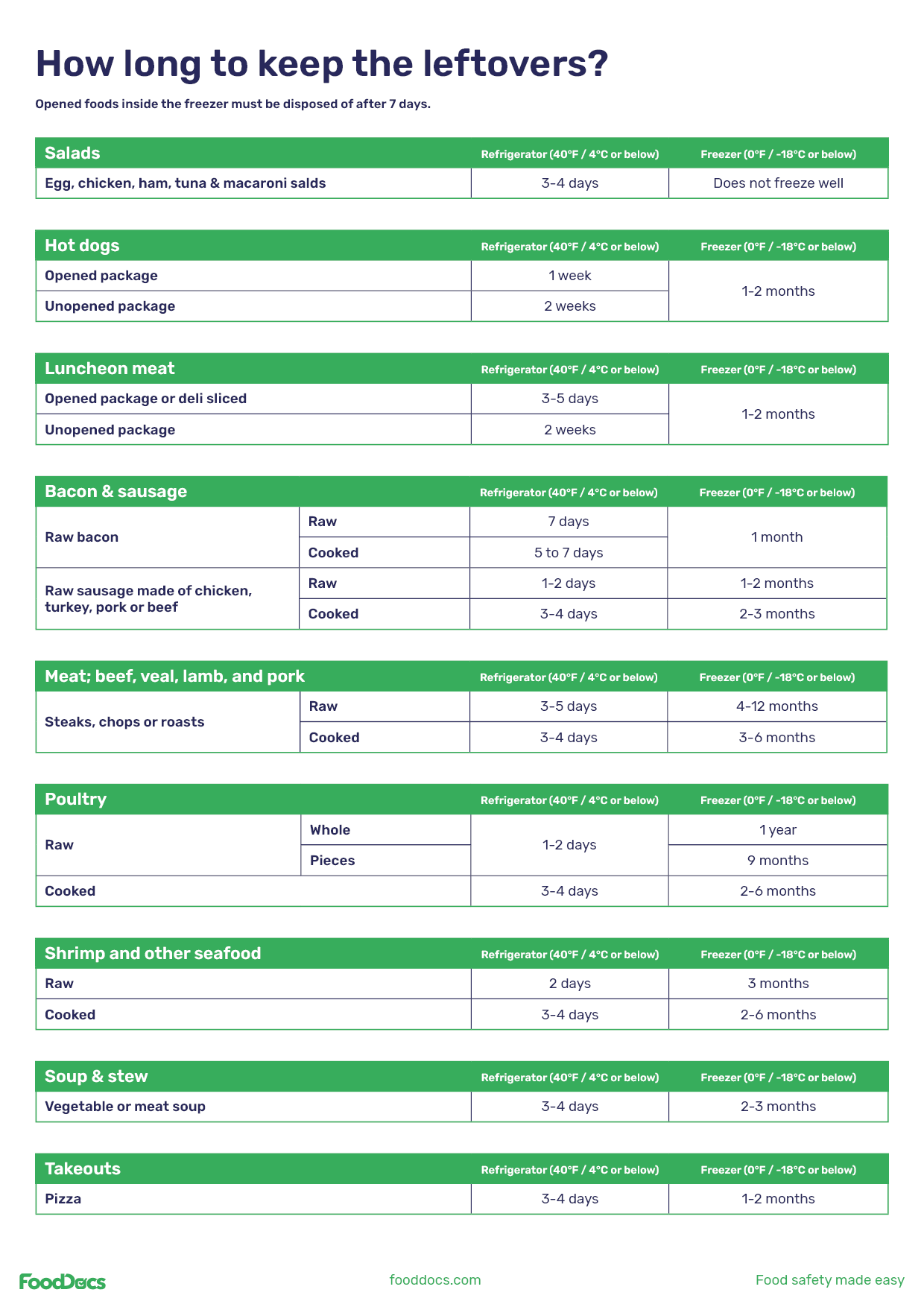

Thank you for downloading free template!
Want to get a customizable HACCP template?
Or set up your food safety system in 15 minutes?
WHAT WE'LL COVER:
Leftovers are typically good for 3 to 4 days when kept in the refrigerator, according to Katherine Zeratsky, R.D., L.D. Beyond this period, especially if you're in doubt, you should dispose of the leftovers. On the other hand, frozen leftovers can be kept safe for three to four months.
It's important for food handlers to understand how long leftovers last in the fridge to optimize their use.
Leftovers are already exposed to external factors after cooking and serving. This means that the risk that they have been cross-contaminated at minimal levels is very likely. Leftovers must be handled properly to maintain safety if they are meant to be served again.
Previous handling and cooking methods can determine how long can you keep leftovers in the fridge. Do not refrigerate leftovers that have been exposed to unsafe temperatures or the temperature danger zone (40°F to 140°F (5°C to 60°C)) for more than two hours. Instead, discard them.
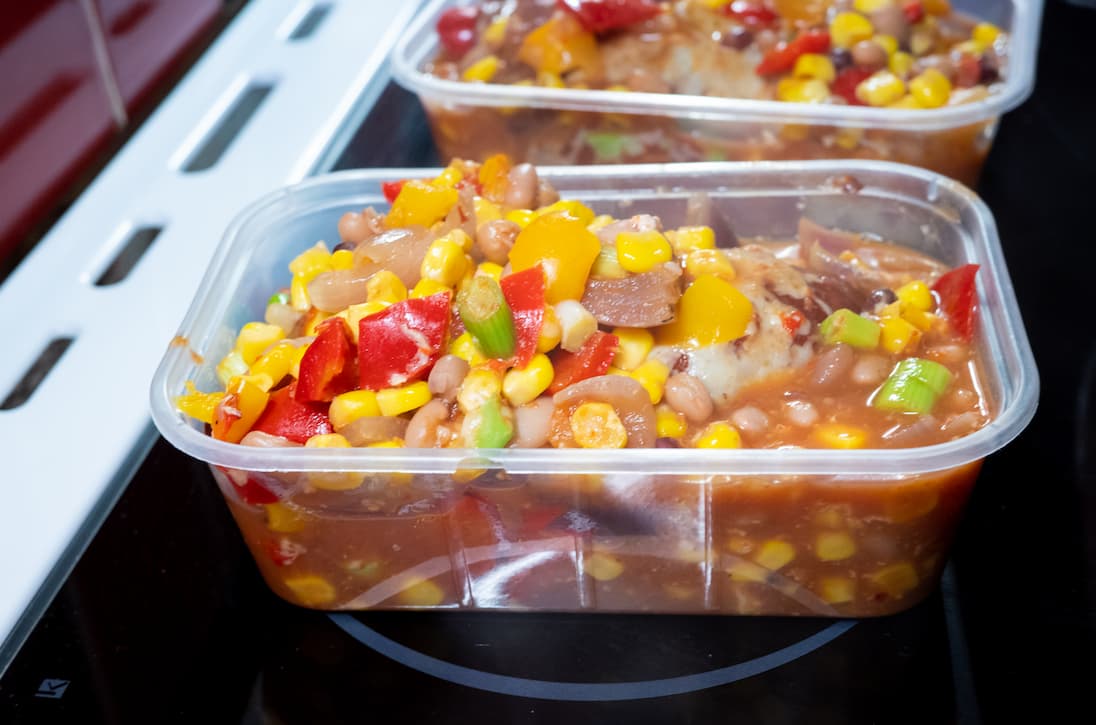
In this section, we discuss the following shelf-life topics:
The shelf-life of different common food items significantly varies based on different factors. A set of cooked food may last longer than raw food when refrigerated, but its quality may decline faster.
Some factors that you have to consider include the following:
If all factors are in favor of the food being stored, then its shelf-life can be maximized. Consuming foods beyond their recommended shelf-life increases the risk of causing symptoms of food poisoning from the effects of dangerous bacteria. In addition, improper storage also increases the risk of generating more food waste.
For more information, read our article about safe, long-term food storage rules.
Fresh eggs can be refrigerated, and they can last up to three to five weeks from the moment that they are placed inside the refrigerator. When frozen, eggs can last up to a year when stored fresh and uncontaminated.
Prolonged refrigeration of eggs may significantly affect their quality, but safety is guaranteed. Eggs that have been refrigerated for too long may start breaking down, which is commonly seen as the egg white becoming runny and separating from the yolk.
In terms of how long do hard-boiled eggs last in the fridge, these products can stay fresh and safe for up to seven days in the refrigerator.
Cooked vegetables can last three to seven days when stored in an airtight container and refrigerated properly. Vegetables are considered high-risk foods and can spoil fast if improperly refrigerated.
Other cooked vegetables, including canned goods, can last for 7 to 10 days inside the refrigerator when properly contained. If the vegetable is uncooked but sliced and washed, such as in the case of cold salads, it can remain safe for up to three to four days.
Vegetables, along with any fresh fruit, are considered highly perishable or high-risk foods. This fact is because vegetables and fruits have very high water content and are rich in vitamins and minerals, which are key requirements for bacterial growth.
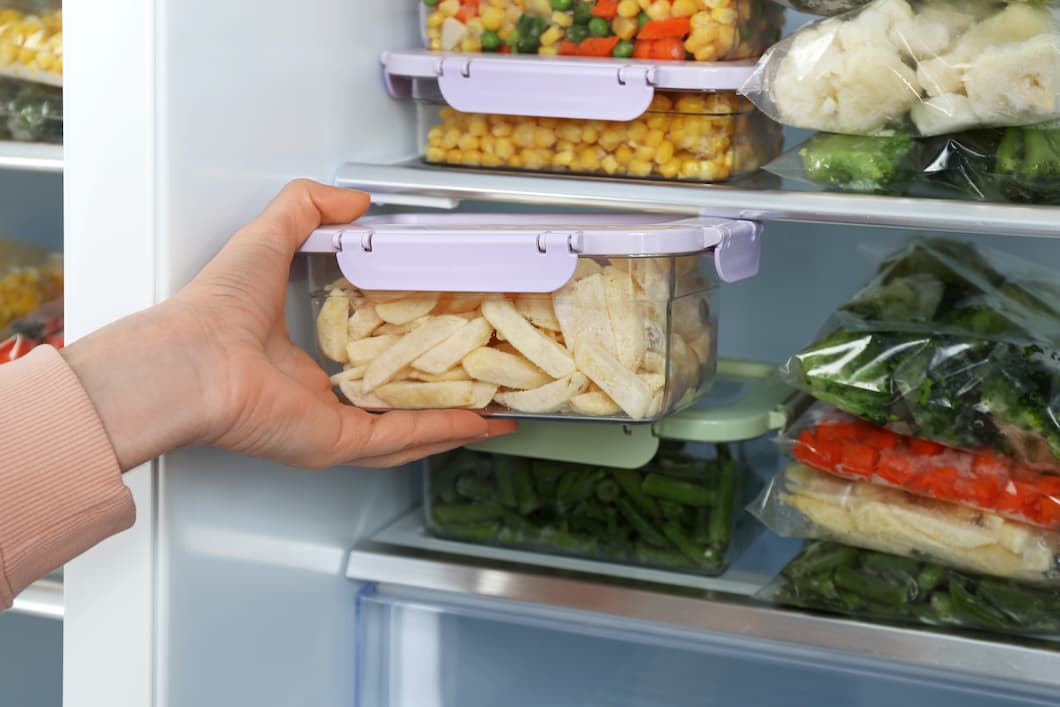
Below, we discuss the different recommended shelf-life duration for the following food products:
In general, cooked meats should only be kept inside the refrigerator for a maximum of 4 days. This estimate will vary depending on the previous handling of food and the type of meat at hand.
Different types of meats are all considered highly perishable. This is regardless of whether the meat product is processed or raw. Meats are very prone to spoilage as they are high in moisture. This raw material usually goes through several other handling stages before being used in the kitchen, making it more exposed to contaminating factors.
Specifically, raw meats, including pork, beef, veal, and lamb, can stay fresh inside the fridge for three to five days. After cooking, the maximum time that they can be refrigerated is four days.
If you want to keep your meat products longer, store them in the freezer. Frozen raw meats can last for up to 12 months if they are stored correctly.
Preserved or processed, raw meats have a slightly longer shelf-life when refrigerated. Raw, unopened packages of bacon have up to two weeks in the refrigerator and seven days when opened. When frozen, raw bacon can last up to one month. Although slices of bacon can last longer than 1 month in the freezer, the quality of the processed meat will continue to decline past the first month.
Other raw, preserved meats, such as sausages, have a shorter shelf-life inside the refrigerator. Since this type of meat product uses ground meat, the product has more exposed surface area.
At most, open packages of sausage will last up to two days inside a refrigerator and a month in the freezer. When cooked, they can last up to four days when refrigerated and up to six months frozen.
Steaks are specific cuts of meat, usually raw beef. Like any other cuts of meat, including chops and roasts, cooked steaks can last for three to four days in the fridge and up to six months when frozen.
On the other hand, raw steak can last for three to five days in the fridge and up to twelve months in the freezer while maintaining its quality. Beyond this time frame, the steak can become dry, and the risk of causing foodborne illness increases as well.
Cooked chicken and poultry can last longer in the fridge. After cooking, chicken products can last in the refrigerator for up to three to four days, especially when properly handled. Cooking inactivates any potential pathogen in poultry meat and allows the product to stay fresh longer.
The safety of raw chicken and other poultry meats is at best within one to two days of refrigeration. This time frame holds for both whole chicken and different cuts of poultry.
When frozen properly, raw chicken can last up to a year, whereas poultry cuts can last up to nine months.
Remember that ground poultry meat has a different shelf-life date than whole or pieces of poultry. According to the U.S. Department of Agriculture, ground chicken can only stay in the freezer for up to 4 months at best. On the other hand, uncooked ground poultry has the same recommended refrigerated storage time frame as whole poultry.
Similar to chicken, raw turkey can last in the fridge for up to two days, whether whole or pieces of meat. The turkey meat must be cooked within this time period to ensure food safety and quality.2
Freezing turkey meat extends the product's shelf-life up to 1 year for a whole turkey bird and 9 months for pieces of it.
If the leftover turkey or other poultry meat has already been thawed once, refrigerating it will only extend its shelf life by up to two additional days. Prolonging its storage will only increase the risk of food poisoning as a result of dangerous levels of pathogenic bacteria.
Once cooked, ground meat can be refrigerated for up to four days and up to four months when frozen. Consuming cooked foods beyond four days of refrigeration increases the risk of causing food poisoning.
Raw ground meats, including hamburger patties, normally stay fresh and safe to consume for one to two days after refrigeration. Ground meat is processed by passing large chunks of meat into a grinder. This process exposes several areas of the meat to external factors, such as air and machine blades.
The exposure that the meat passes through increases the risk of contaminating the food.
If frozen, raw ground meat can stay safe and fresh for three to four months.
Cooked shrimp and other seafood can be stored in the refrigerator for three to four more days.
Raw shrimp, along with other types of seafood, can last up to 2 days in the fridge before cooking. Make sure to cook them within this period to ensure safety.
Keeping shrimp in the freezer extends their shelf life up to three months. Remember that the quality of seafood changes more quickly than other meats. Prolonging their storage in the freezer runs the risk of losing their food quality.
Ideally, cooked rice should be immediately consumed after cooking. If there is any leftover rice, it can be refrigerated for no more than four days or frozen for a maximum period of one month.
Factors that will determine how long can you keep cooked rice in the fridge must be considered. The estimated time frame can only be true if the rice was thoroughly cooked, handled properly, and contained in a clean, airtight food storage container. Rice is a high-risk food that supports the growth of bacteria.
Spoiled foods will produce observable changes indicating that they are no longer safe for consumption. Once food handlers or consumers notice any indication that the food is already spoiled, consuming or serving it must no longer be an option.
Here are some signs that the food has already gone bad and should no longer be consumed:
Consuming foods with any of these signs of spoilage can cause foodborne illness, especially for consumers with weak immune systems. It is highly unadvisable to taste the food to determine if it is spoiled.
In some cases, spoiled foods may have very unnoticeable signs of spoilage. This event can be dangerous for consumers. Always follow the proper food storage guide to ensure that foods will remain fresh and safe.
As mentioned, the estimated shelf-life of food foods can only be truly achieved if the food products are handled and stored properly. If food gets contaminated before refrigeration, it can still become spoiled and cause foodborne diseases.
Refrigeration only slows down the multiplication of pathogens, whereas freezing stops them. Once the food is removed from low-temperature storage, the progress of spoilage will continue.
To ensure that food will remain safe during storage, follow these food safety rules for leftovers:
Maintain compliance with these storage rules for leftovers by consistently monitoring your food supply. Use our digital Food Safety Management System that can automatically generate monitoring logs and checklists to help your employees monitor storage rules.
Reheating leftover foods before using or serving them again is a critical operation. Proper reheating is a must to ensure that the leftovers are safe for consumption and will not contaminate other food products during cooking.
When reheating leftover food that has been in cold storage, always ensure that the product's internal temperature will reach 165°F (74°C). Food handlers must ensure this target by using a calibrated food thermometer.
When reheating, the food must be consistently stirred using a sanitized ladle. Stirring ensures that the heat is evenly distributed for uniform cooking. This operation is also required even if you are reheating foods using a microwave oven.
Leftover foods are previously exposed to external factors and may have been contaminated. Properly handling and cooking them will ensure their safety and prevent causing foodborne illnesses.
Ideally, leftover "leftovers" should not be refrigerated again, especially if they were exposed to the temperature danger zone for more than 2 hours. In this case, dispose of the food immediately.
Test your employees' knowledge of food safety with our food safety quiz.
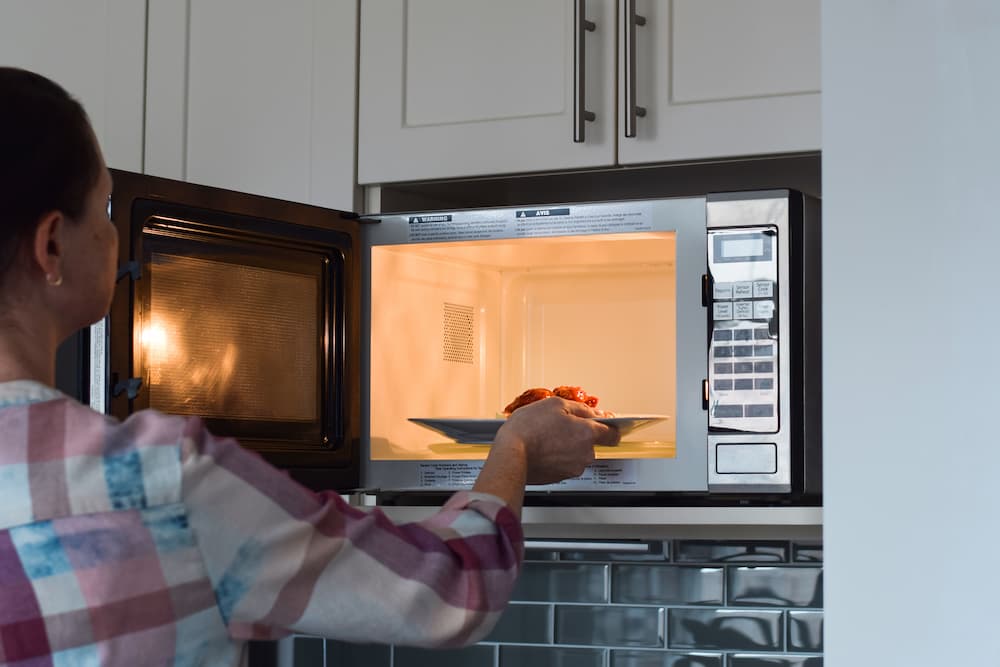
One key element in managing high-risk foods such as leftovers is close monitoring. This type of food has a very high risk of spoiling or getting contaminated because of its nature and previous exposure to external factors.
When handling leftovers, proper handling, cooking, refrigerating, and temperature controls are essential. At FoodDocs, our digital Food Safety Management System can help you monitor these tasks all at once, most efficiently.
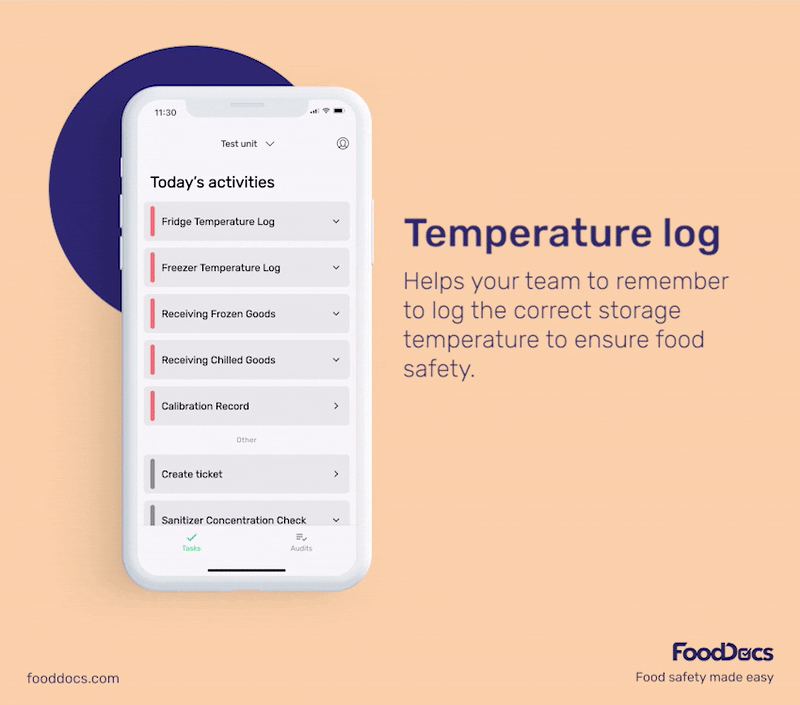
You can get the following benefits using our smart software powered by artificial intelligence:
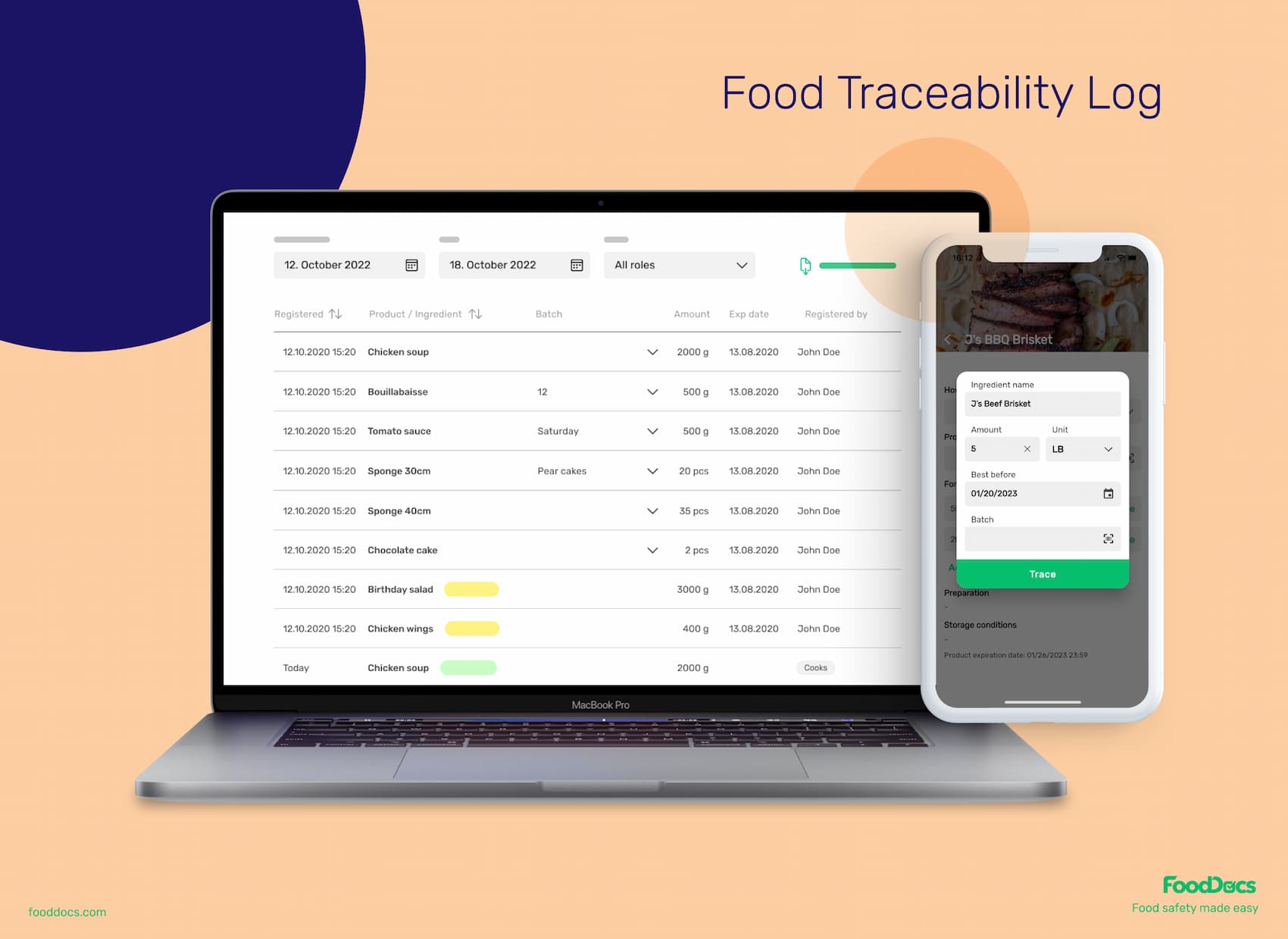 Food Traceability Log from FoodDocs
Food Traceability Log from FoodDocs
In addition to managing your ingredients, our system can also help you manage your entire operations with smart solutions:
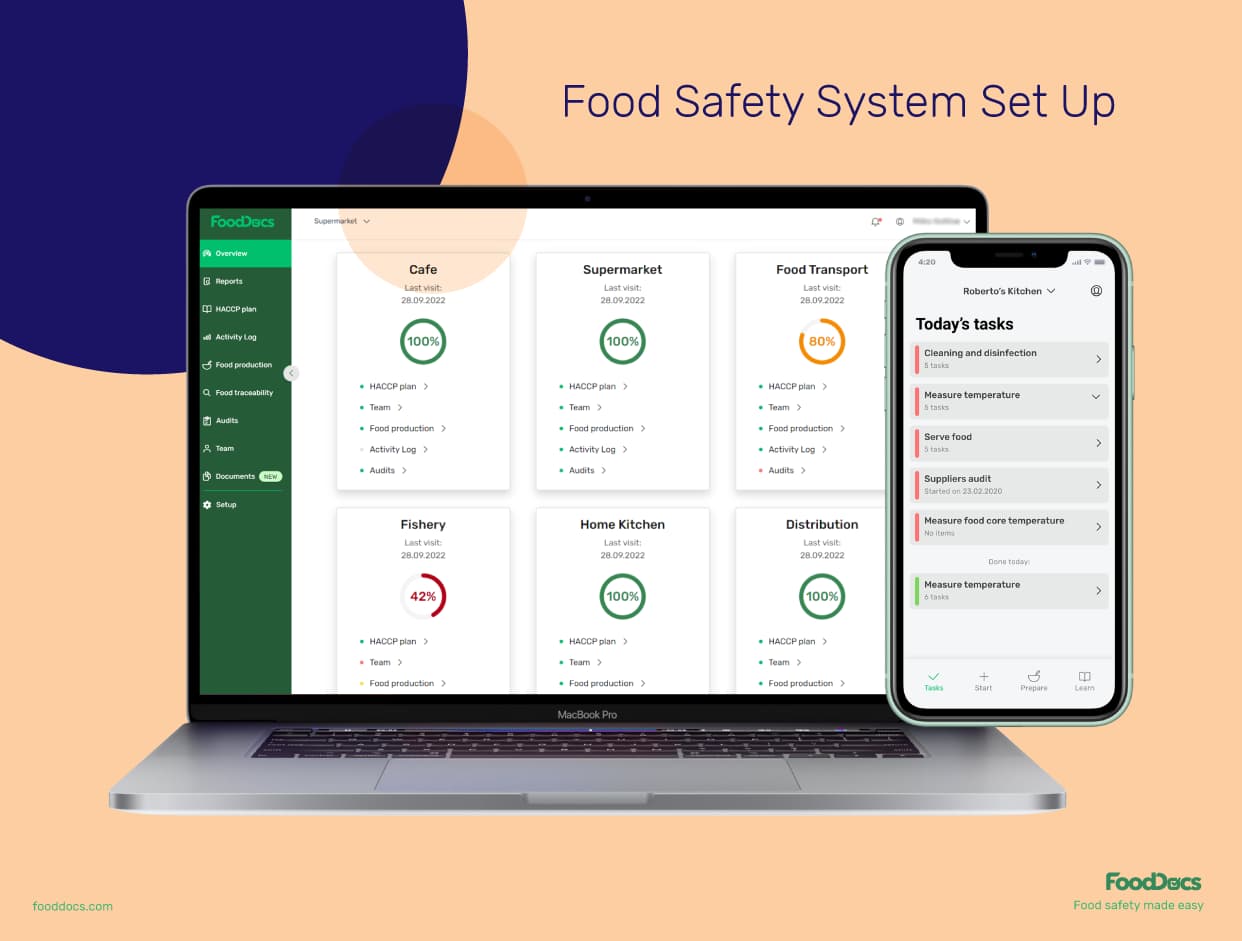 Food Safety System Set up by FoodDocs
Food Safety System Set up by FoodDocs
Switching to our digital food safety platform from your usual pen-and-paper method does not take much effort. Our system ispowered by artificial intelligence and a machine-learning program, making the switch a hassle-free task. The whole process can take as fast as 15 minutes.
All you have to do is describe your operations to our system by answering a few basic questions. All digital food safety documents will be automatically generated based on your answers.
Ensure that your team knows how to handle leftovers while consistently monitoring them. Use our digital solutions to maintain safety and prevent causing foodborne illnesses.
Start your digital food safety management journey by using our free 14-day trial now.
Here are some additional questions that will help you understand this topic more.
Refrigerated Thanksgiving leftovers can stay safe for up to three to four days. This estimated time is only true if the Thanksgiving food has been handled properly. Otherwise, the food may spoil faster than expected.
Health and safety agencies suggest that leftovers are only good for up to four days inside the fridge. This recommendation is based on the likelihood of food spoilage in the case of high-risk foods.
Some sure signs that leftovers are already bad include the following:
The ideal time frame for keeping leftovers in the refrigerator is three to four days. Beyond this time, the foods may no longer be safe to consume.
Sushi can stay safe for consumption for one to two days in the fridge. Sushi consists of different high-risk foods and can easily spoil when stored incorrectly.
Master restaurant sanitizing with clear steps for kitchens and dining areas. Learn methods, checklists, and procedures to keep your team safe and...
Learn challenges healthcare foodservice teams face today and key food safety practices to protect vulnerable patients. Get a free healthcare leader...
Learn what Standard Operating Procedures (SOPs) are and how to write effective SOPs that ensure consistency, efficiency, and safety in your...